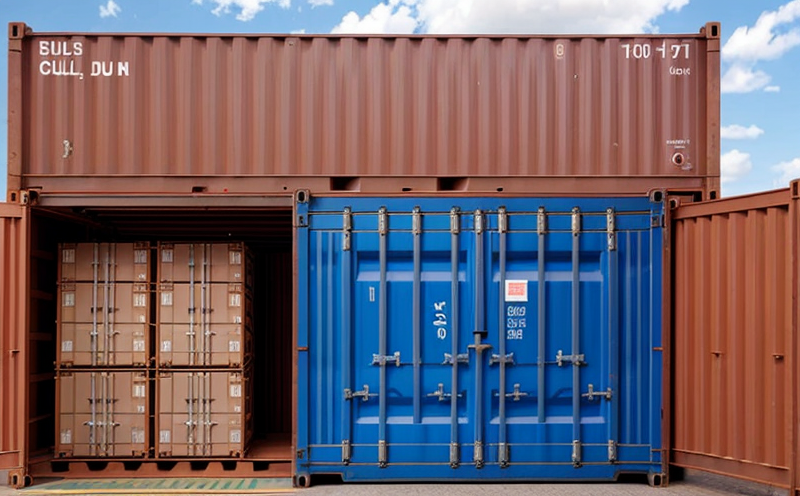USP Thermal Stability of Packaging Testing
The United States Pharmacopeia (USP) thermal stability testing is a critical component in ensuring that pharmaceutical packaging meets stringent quality and safety standards. This service ensures that the container closure system remains intact under various temperature conditions, safeguarding the integrity of the drug product throughout its shelf life. The test evaluates how well the package withstands heat exposure without compromising the seal or integrity of the container.
Thermal stability testing is crucial for packaging materials used in the pharmaceutical industry because it helps to determine if the container closure system can protect the active ingredients and excipients from degrading due to elevated temperatures. This is particularly important as many pharmaceutical products are sensitive to temperature changes, which could lead to reduced efficacy or even safety risks.
The testing process involves exposing packaged samples to controlled heat conditions over specific time periods. The specimens are then inspected for any signs of degradation such as discoloration, leakage, or loss of seal integrity. Compliance with USP standards is essential for pharmaceutical companies aiming to ensure the quality and reliability of their products across various markets.
Our laboratory adheres strictly to current Good Manufacturing Practices (cGMP) and follows all relevant regulations set by the United States Pharmacopeial Convention (USP). This ensures that our testing results are accurate, reliable, and meet the highest industry standards. We use state-of-the-art equipment and follow rigorous protocols to ensure consistent and repeatable test outcomes.
The USP provides several chapters for thermal stability testing of packaging materials; these include USP Chapter 1079 for container closure systems, which specifies the conditions under which containers must be tested. This chapter ensures that all containers used in pharmaceutical packaging comply with the necessary requirements to maintain product integrity.
The testing process typically involves multiple stages where different samples are subjected to varying temperatures and time durations. For instance, some samples may undergo a 48-hour exposure at 60°C, while others might be exposed for longer periods or at higher temperatures like 75°C or even 90°C. The duration of the test can vary depending on the specific requirements outlined in the USP guidelines.
Post-testing evaluation is equally crucial as it provides insights into how well the packaging materials performed under extreme temperature conditions. Our team meticulously inspects each sample for any signs of damage, discoloration, or leakage. Any deviations from expected performance are noted and reported back to our clients for further analysis and corrective actions.
By conducting thorough thermal stability tests on pharmaceutical packaging, we help ensure that the products remain safe and effective throughout their shelf life. This service is vital not only in maintaining regulatory compliance but also in enhancing patient confidence by ensuring product quality and safety.
Applied Standards
| Standard | Description |
|---|---|
| USP Chapter 1079 | Container Closure Systems for Packaging of Pharmaceutical Products. |
| ISO/IEC 17025:2017 | Laboratory Accreditation Requirements. |
| ASTM D6439-18 | Standard Practice for Testing and Qualifying Container Closure Systems for Packaging of Pharmaceuticals. |
Benefits
Thermal stability testing is essential in the pharmaceutical industry as it ensures that packaging materials can withstand high temperatures without compromising product integrity. This service helps manufacturers adhere to regulatory requirements and enhances consumer confidence by ensuring drug products remain safe and effective throughout their shelf life.
By conducting these tests, we provide valuable data that can guide improvements in packaging design and selection. Our clients benefit from this information as it allows them to make informed decisions about the materials they choose for their products. Additionally, compliance with USP standards ensures a consistent quality standard across different markets, reducing the risk of recalls or product withdrawals.
Our testing service also facilitates smoother supply chain management by identifying potential issues early in the development process. This proactive approach helps minimize costs associated with post-market recalls and ensures that the packaging meets all necessary regulatory requirements.
The results from our USP thermal stability tests are crucial for regulatory submissions, providing evidence of compliance with relevant standards. For R&D teams, this data can be used to refine formulations and improve product performance. Procurement officers benefit from this service as it allows them to select suppliers based on reliable test outcomes, ensuring that the highest quality materials are used in their products.
Industry Applications
- Ensuring compliance with USP standards for pharmaceutical packaging.
- Evaluating the integrity of container closure systems under heat exposure.
- Determining the stability of drug products during transportation and storage.
- Identifying potential issues early in the product development process to avoid costly recalls.
- Maintaining consistent quality across different markets by adhering to international standards.
- Enhancing consumer confidence through proven product integrity.
- Supporting regulatory submissions with reliable test data.





